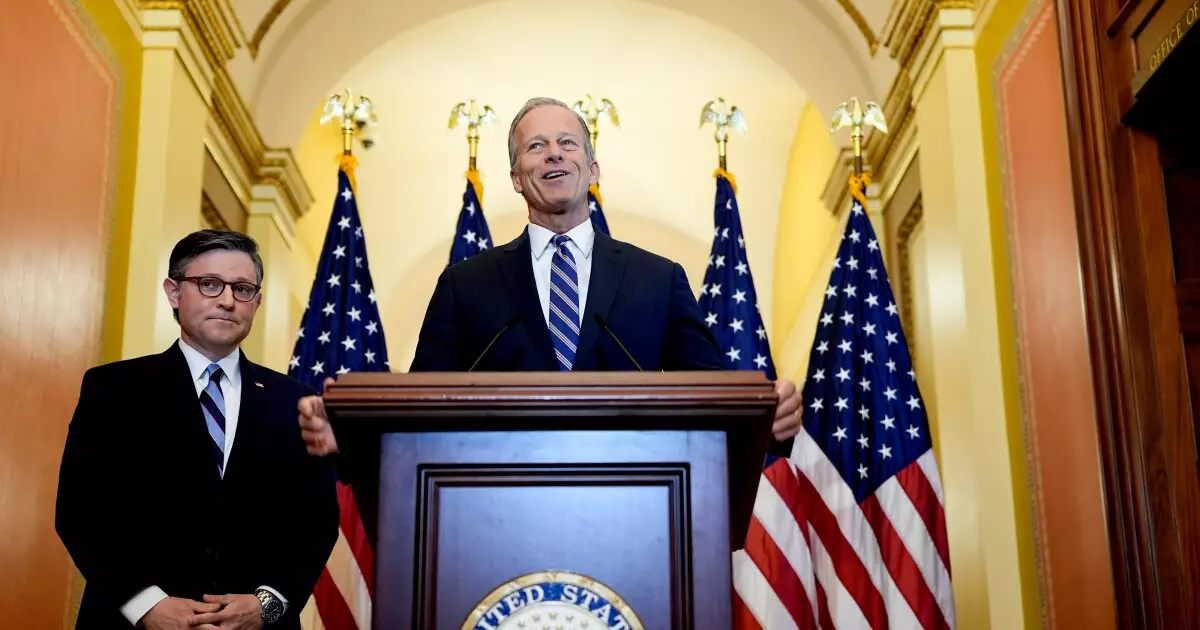In a recent turn of events, President Donald Trump’s budget proposal, dubbed the “big beautiful bill,” clawed its way through the House of Representatives with a narrow 216-214 vote. However, this so-called victory should serve as a wake-up call to both conservatives and liberals alike. As the gavel slammed down, the sheer audacity of a budget plan that promises $5 trillion in tax cuts while simultaneously attempting to propose $1.5 trillion in spending cuts reveals not just a reckless approach to fiscal policy, but a complete disregard for the complexities of managing a national economy.
This budget’s passage is not simply a win for Trump or House Speaker Mike Johnson; it symbolizes how political maneuvering can overshadow the long-term health of our economic system. The alarming push from Republican leaders to persuade holdouts to back a bill that lacks genuine fiscal responsibility is indicative of a broader issue: a disconnect between the promises of conservative governance and the realities of economic planning.
The Allure of Tax Cuts and the Illusion of Efficiency
The main selling point of the budget resolution lies in the promise of tax cuts. Republicans tout it as an opportunity to bolster economic growth through personal and corporate tax reductions. However, one must ask: at what cost? The plan’s aggressiveness—suggesting that up to $4.5 trillion could be achieved in tax cuts if additional spending cuts are found—poses a threat to existing social programs and essential services.
Leaders like Mike Johnson claim they’re aiming for a “leaner” government. Yet, leaner does not equate to effective. Reducing federal spending without careful consideration of the impacts on various sectors could lead to disastrous consequences for those dependent on government programs. The promise of efficiency sounds appealing, but it’s a dangerous oversimplification that masks complex fiscal realities.
A Cautionary Tale from Conservative Dissenters
One of the most significant aspects of this budget vote was the dissent from within the Republican Party. Representatives like Thomas Massie and Victoria Spartz opted to voice their concerns, condemning the plan as a recipe for the largest deficit increase in U.S. history. Their words resonate with a deeper truth: a federal budget that prioritizes tax giveaways, while offering token cuts, risks exacerbating the very fiscal issues conservatives purport to address.
When even members of one’s party express alarm, it should prompt a reconsideration of realigning priorities that genuinely foster economic stability. Instead of crafting a budget that serves the political whims of the moment, lawmakers should focus on sustainable economic policies that prepare America for future challenges rather than creating a “Pandora’s box” of fiscal irresponsibility.
Municipal Bonds and The Underlying Risks
As the GOP advances deeper into the details of this budget, market participants express fears that the cut cuts aimed at municipal financing might take the brunt of the revenue-raising strategies. It begs the question: what future do we want to craft for our cities and local governments? Ignoring the negative ramifications on municipal bond tax exemptions jeopardizes not just local projects but the very essence of how communities function and thrive.
Markets respond to uncertainty, and uncertainty arises when policymakers signal they are willing to strip away essential funding for infrastructure and public services. By neglecting the implications of their proposed cuts, conservative leaders risk pushing our cities and towns into a corner, further entrenching them into a cycle of financial instability.
A Moment for Compromise or a Step Backward?
What is ultimately troubling in this budget drama is the troubling narrative that party leaders are willing to construct at any cost. This resolution overrides caution in favor of the sensational allure of grand promises without accountability. While a significant faction of the conservative bench calls for deeper cuts and austere measures, this budget plan could very well lay the groundwork for increased divisiveness rather than the collaborative spirit intended by its proponents.
With rising polarization in American politics, bipartisan cooperation is more essential than ever. The reckless pursuit of short-term wins will yield long-term ruin if leaders fail to listen to dissenting voices within their ranks and engage constructively with their counterparts across the aisle. As this contentious budget battle unfolds, the potential fallout is not just a political defeat—it’s an economic gamble that could spell calamity for Americans at all levels of society.

